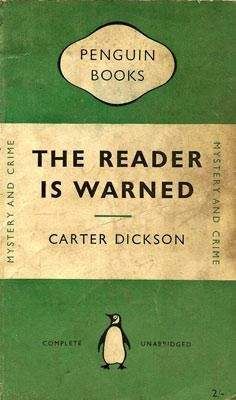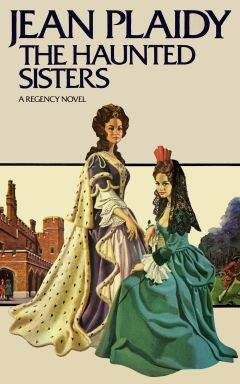John Carr - The Plague Court Murders
"Ah! That's it. Who would? And why? Would you call it a piece of deliberate cruelty, now, or was there a reason? Eh, Mr. Blake?"
"I was thinking," I said, "of the enigmatic Mr. Darworth. You were going to tell us something about him, you know. By the way, where is he?"
"Steady-!" Masters struck in quietly, and raised his hand.
We could hear voices and the sound of footsteps coming through the house. They were palpably human voices; yet such was the trick of echoes in this stone labyrinth that they seemed to sheer off the wall and echo softly in your ear just behind you. First there was a gruff mumble in which we could catch scattered words:
"-don't hold with the mumbo-jumbo ... all the same ... look a damned fool ... something.”
"That's it, that's just it!" The other voice was lower, lighter, more excited. "Why do you feel like that? Look here, do I look like any namby-pamby aesthete who could be gulled and hypnotized by my own nerves? That's the ridicule you're afraid of. Trust yourself! We've accepted modern psychology...."
The steps were coming from beyond a low archway at the rear of the hall. I saw the light of a candle shielded in somebody's hand; there was a glimpse of a whitewashed passage with a brick floor; then a figure stepped into the hall, and saw us. It jerked back, bumping into another figure. Across that space you could almost feel its shock and stiffening. I saw a mouth suddenly pulled back, and the teeth, over the candle it held. It muttered, "Oh, Christ. . ." And Halliday threw back in a matter-of-fact tone, faintly edged with spite: "Don't get the wind up, Ted. It's only us."
The other peered, straightening his candle. He was very young. Over the candle-flame hung first a careful Etonian tie, then an uncertain chin, the sproutings of a fair mustache, the faint outline of a square face. His coat and hat were sodden. He said, querulously:
"You ought to have better sense than to try to scare a fellow like that, Dean! I mean, hang it all, you can't go crawling about the place, and-and-" We heard the whistle of his breath.
"Who the devil are these people?" rasped his companion, who had come out from behind him. We threw up our lights mechanically to see the newcomer; he cursed and winked, and we lowered them. Besides these two, there was a thin little red-headed figure behind them.
"Good evening, Major Featherton," Halliday greeted. "As I say, you needn't be alarmed. I seem to have the unenviable quality of making everybody I meet jump like a rabbit." His voice kept rising. "Is it my face, or what? Nobody ever used to think it was so frightful as all that, but as soon as they begin talking to Darworth---“
"Confound you, sir, who says I'm alarmed?" said the other. "I like your infernal, blasted cheek. Who says I'm alarmed, sir? Furthermore, I will repeat to you, as I will repeat to everybody I meet, that I hope I am a fair-minded man, whose motives will not be misunderstood or made a subject for ridicule because I preserve-because, in short, I am here." He coughed.
The voice in the gloom sounded like a disembodied letter to The Times. The paunchy figure tilted slightly backwards. From the brief glimpse I had had of him, of the map-veined cheeks and cadaverous eyes, I could fill out the bigness of an outworn buck and gallant of the eighties, tightened into his evening clothes like a corset.
"I shall have rheumatism for this," he protested, weakly and almost cajolingly. "Besides, Lady Benning asked my assistance, and what could a man of honor do?"
"Not at all," said Halliday, without particular relevancy. He drew a deep breath. "Well, we've seen Lady Benning too. My friends and I are going to watch and wait for the ghost-laying with you. Now we're going to have a look at the little house out there."
"You can't," said Ted Latimer.
The boy looked fanatical. A smile twitched round his lips, as though he had lost control of the facial muscles. "You can't, I tell you!" he repeated. "We've just put Mr. Darworth in there. He asked to go. He's begun his vigil. Besides, you daren't, even if you could. It's too dangerous, now. They'll be out.. And it must be” -his thin, angular eager face, very much like his sister's, bent over his wristwatch-"yes. Yes, it is five minutes past twelve."
"Damn," said Masters. It was unexpected, as though the word had been shaken out of him. He took a step forward, his footfall squeaking on the rotting boards towards the rear of the hall, where the floor had not been lifted from the flagstones. I remember thinking, with that dull focus of mind which fastens on trivial details at such moments, that the rest of the flooring had probably been fine hardwood. I remember Ted Latimer's grimy hand, with its grease-covered knuckles, thrust far out of his sleeve. I remember that colorless figure of the red-headed youngster in the background, vague by candlelight touching its hair, brushing its face, in inexplicable and rather horrible pantomime. . . .
It was to him that. Ted Latimer turned. The candle-flame swung, fluttering with thin noise. His motions abruptly stopped.
"We'd better go into the front room, hadn't we?" Ted demanded. "In the front room, where it's safe, and they can't come. Hadn't we?"
"Yes, I suppose so," replied a colorless voice. "Anyway, that's what I'm given to understand. I never see them, you know."
So this was Joseph, saving the fantastic incongruity of names, whose dull freckled countenance appeared incurious. The candle fluttered round again, and the shadows took him.
"You see?" inquired Ted.
"Monstrous!" said Major Featherton suddenly, for no reason at all.
Halliday strode forward, with Masters after him. "Come along, Blake," he said to me; "we're going to have a look at that place."
"They're out now, I tell you!" cried Ted. "They won't like it. They're gathering, and they're dangerous."
Major Featherton said that as a gentleman and a sportsman he considered it his duty to go along and give us safe conduct. Stopping short, Halliday gave him a kind of satirical salute, and laughed. But Ted Latimer touched his arm, grimly, and the major allowed himself to be led towards the front of the hall. They were all moving now, the major with a rolling stateliness, Ted hurriedly, Joseph in obedient and unperturbed slowness. Our lights followed the footsteps of that little procession, and the high darkness pushed round us like water, and I turned towards that little whitewashed passage that led out to where the rain was splashing....
"Look out, man!" said Masters, and dived to yank Halliday aside.
Something fell out of the darkness. I heard a crash; somebody's flashlight jumped and vanished; and, while the vibrations beat and whirled round my ears, I saw Ted Latimer turn round with staring eyeballs, his candle held high.
IV TERROR OF A HIGH PRIEST
FULL in the beam of my electric torch, Halliday sat on the floor, supporting himself with his hands behind him, and looking dazed. Another beam - Masters' after flickering on him momentarily, had gone straight up into the vault like a searchlight; it was playing over the staircase, the stair-rail, the landing immediately above. They were empty.
Then Masters faced round on the group of three. "Nobody is hurt," he said heavily. "You'd better go into the front room, all of you. And hurry. If they are alarmed, tell them in there - we will join them in five minutes."
They did not argue, but turned into the room and the door scraped shut.
Then Masters began to chuckle.
"That's torn it, sir. They're cool, they are. Why, sir," said the inspector, with a sort of broad tolerance, "that's one of the oldest, stalest, childishest tricks in the whole bag. Talk about whiskers. . . . Lummy! You can rest easy now, Mr. Halliday. I've got him. I always thought he was a fake. And I've got him now."
"Look here," said Halliday, pushing back his hat, "what the devil happened anyway?" His voice was under control, but a muscle jerked in his shoulder, and his eyes wandered round the floor. "I was standing there. And then something hit the flashlight out of my hand; I was holding it loose. I think" - he experimented, without rising - "I think my wrist is numb. Something hit the floor, something came flying down; bang! Ha. Ha ha. Funny, maybe, but damned if I see it. I need a drink. Ho ho."
Masters, still chuckling, turned the beam on the floor. Lying a few feet in front of Halliday were the smashed fragments of a vessel so heavy that the shards had scattered very little, and a third of it was still intact. It was of grayish stonework, now black with age: a sort of trough some three feet long and ten inches high, which must once have held flowers. Masters' chuckle died, and he stared.
"That thing-" he said, "my God, that thing would've crushed your head like an orange.. You don't know how lucky you are, sir. It wasn't meant to hit you, of course. They didn't mean it; not them! That wasn't on the cards. But a foot or two to the left.. .
"They?" repeated Halliday, starting to get up. "You don't mean-?"
"I mean Darworth and young Joseph, that's who. They only meant to show that the powers, the evil powers, were getting out of control; that they were fighting us, and firing that stone thing at you because you insisted on coming here. It was for somebody, anyhow... That's right. Look up. Higher. Yes, it came from the top of the staircase; from the landing.... Halliday's knee-muscles were not as steady as he had thought. He knelt there, absurdly, until his own rage helped him to his feet.
"Darworth? Man, are you telling me that – that swine," he pointed, "stood up there on the landing, and dropped-? -"
"Steady, Mr. Halliday. Don't raise your voice, if you please - not at all. I don't doubt Mr. Darworth is out there where they left him. Just so. There's nobody on the landing. It was that kid Joseph."
"Masters, I'll swear it wasn't," I said. "I happened to have my light on him the whole time. Besides, he couldn't have---“
The inspector nodded. He seemed possessed of an endless patience. "Ah? You see? That's part of the trick. I'm not exactly what you'd call an educated man, gentlemen," he explained, with a rather judicial air and broad gesture, "but this trick, now ... well, it's old. Giles Sharp, Woodstock Palace, sixteen forty-nine. Anne Robinson, Vauxhall, seventeen seventy-two. It's all in my files. A gentleman at the British Museum has been very helpful. I'll tell you. how they worked it in just a minute. Excuse me."
From his hip-pocket, solicitous as a steward, he whipped out a cheap gunmetal flask, which had been carefully polished. "Try some of this, Mr. Halliday. I'm not a drinking man myself, but I always take it along when I tackle matters of this kind. I find it useful-eh? For others, I mean. There was a friend of my wife, who used to go and visit a medium at Kensington.”
Halliday leaned against the stairs and grinned. He was still pale; but, somehow, a great weight seemed lifted from him.
"Go on, you swine," he said abruptly, peering up at the landing. "Go on, damn you. ' Chuck another." He shook his fist. "Now that I know the thing's a trick, I don't care what you do. That's what I was afraid of: that it wasn't. Thanks, Masters. I'm not quite so bad as your wife's friend, but that thing was a jolly close call. I will have one.... The question is, what do we do now?"
Masters motioned us to follow, and we went over the creaking boards and out into the moldy gloom of the passage beyond. Halliday's flashlight was smashed, and I offered him mine; but he refused it.
"Look sharp for more traps," the inspector growled in a whisper. "They may have the whole house flummoxed.
The point's just this. Darworth and Company are up to some game. They mean to put on a show of some sort, and for some more than ordinary reason. I want to find out why, but I don't want to crash in on Darworth," he nodded, "out there. If I could make sure he doesn't leave his post, and at the same time keep an eye on that kid……Hum. Hay-em – “
All this time his light had been taking in details. The passage was narrow, but of great length, and reenforced by heavy beams; on either side were half-a-dozen doors, set beside barred windows apparently giving on interior rooms. I tried to conceive their purpose, in the middle seventeenth century when this house had been built, and then I remembered. Merchant's warehouse rooms, of course.
Peering through one set of bars (it might have been a counting-house), I saw a tank-like desolation strewn with forgotten firewood. I had hazy remembrances of speckled porcelain, Mecca muslin, canes and snuff-bottles, which was curious, because I could not remember having read of these things. The images came suddenly, mixed with the stifling uneasy air. There were no forms or faces - if you can except the suggestion of somebody pacing up and down, up and down, endlessly, on the brick floor :but only the things of finery. I cursed myself for growing light-headed in the bad air; yet the blight of this house grew and grew in my brain. Staring at the dropsical walls, I wondered why they called it Plague Court.
"Hullo!" said Masters, and I pulled up short behind Halliday.
He had reached a door at the end of the passage, and had been peering outside. The rain fell very lightly now. On our right, a smaller passage wandered off into a black rabbit-warren of kitchens which looked like burnt-out furnaces. The other door led into the yard. Turning his light upwards, Masters pointed.
It was a bell. A rusty bell set into an iron framework, about the size of a top-hat, and it hung in the low roof just over the door to the yard. Since it seemed only a means of communication from the old days of the house, I saw nothing odd about it until Masters shifted his lamp a little, and pointed again. Down the side of the bell ran a length of fine wire, new wire; gleaming faintly.
"More tricks?" said Halliday, after a pause. "Yes. It's wire right enough. It goes . . . here, down the side, out through the boards of this window, into the yard. Is this another stunt?"
"Don't touch it!" said Masters, as the other stretched up his hand. He peered out into the dark. The cool wind brought a smell of mud, and other odors less pleasant. "Don't want to call the attention of our friend out there, but I shall have to risk a flash.... Yes. The wire comes out, down, and runs across the ground towards the little stone house. Hurrum. Well ..."
With him we stared out. The rain had died to a mutter of splashings, to stirrings along the gutters and a sullen drip-drip dose beside us, but it still made prankish noises in the yard. I could see very little, for the sky was overcast, and shapes of buildings blocked it out round the wall which enclosed the big piece of ground at the rear. The little stone house was about forty yards away from us. Its only light was a flickering gleam that showed, slyly, at the gratings of little embrasures - they were too small to be called windows - set dose under the roof. It stood lonely, with a crooked tree growing near it.
The light flickered again, curled eerily, with a sort of invitation, and shrank back. That faint spatter and stir of the rain made the muddy yard sound as though it were infested with rats.
Halliday made a movement like one who is cold.
"Excuse my ignorance," he said. "This may seem excellent fun, but it isn't sense. Cats with their throats cut. Bells with wire attached to them. Thirty-odd pounds of stone flower-box chucked at you by somebody who, isn't there. I'm like the chap at the Circumlocution Office; I want to know. Besides, there was something in that passage - I could have sworn.... "



